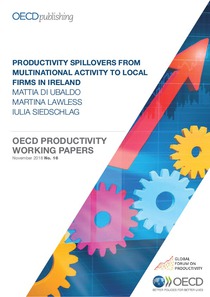Productivity spillovers from multinational activity to local firms in Ireland

Di Ubaldo, Mattia ; Lawless, Martina ; Siedschlag, Iulia
Organisation for Economic Co-operation and Development, Paris
OECD Publishing - Paris
2018
32 p.
productivity ; multinational enterprise ; foreign investment
OECD Productivity Working Papers
16
Production management
https://doi.org/10.1787/58619717-en
English
Bibliogr.
"As well as their direct effects on output and employment, the attraction of foreign direct investment is sometimes argued to provide further economic benefits through spillover effects that potentially increase the productivity performance of domestic firms. Empirical evidence on these indirect effects has however tended to be mixed. This paper uses Irish firm-level data on both manufacturing and services firms to re-examine and update evidence on intra-industry and intra-region spillovers and then extends the previous research by examining if spillovers are more likely to occur through supply chain linkages. In addition, we consider the heterogeneity of investors and allow the spillover effects to differ for foreign affiliates owned by EU and non-EU based parent companies. Finally, we examine the role of domestic firms' absorptive capacity in conditioning the effects of spillovers from multinationals on their productivity. Overall, we find limited evidence or a negative link between the presence of foreign-owned firms and the productivity of domestic firms in the same industry or the same region. Examining forward and backward linkages through supply chains indicates that on average, selling to foreign-owned firms had a positive effect while buying from foreign owned firms had a negative effect on the average productivity of domestic firms. Finally, considering the absorptive capacity of domestic firms and allowing the spillover effects to differ depending on the origin of the parent companies, we find that the positive productivity spillovers come from supply chain linkages between domestic firms investing in R&D and foreign affiliates of multinationals with headquarters based outside the EU."
Digital
The ETUI is co-funded by the European Union. Views and opinions expressed are however those of the author(s) only and do not necessarily reflect those of the European Union or the ETUI.